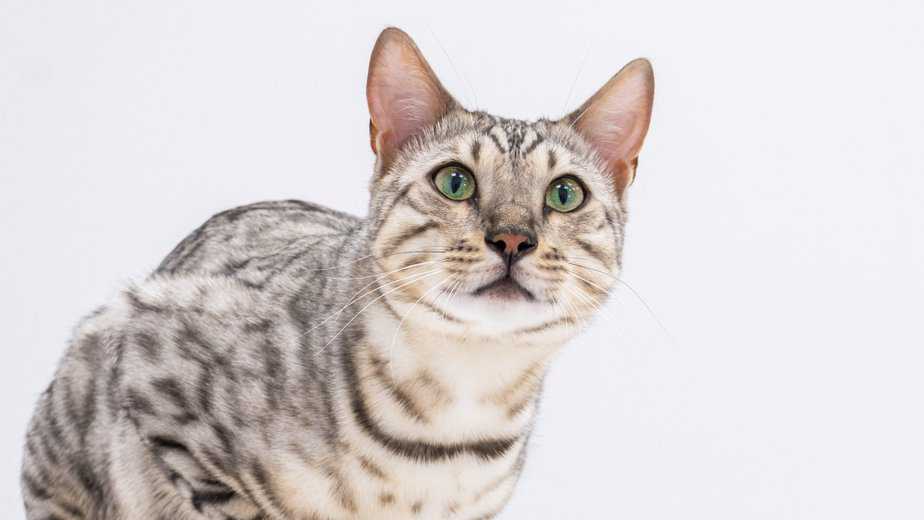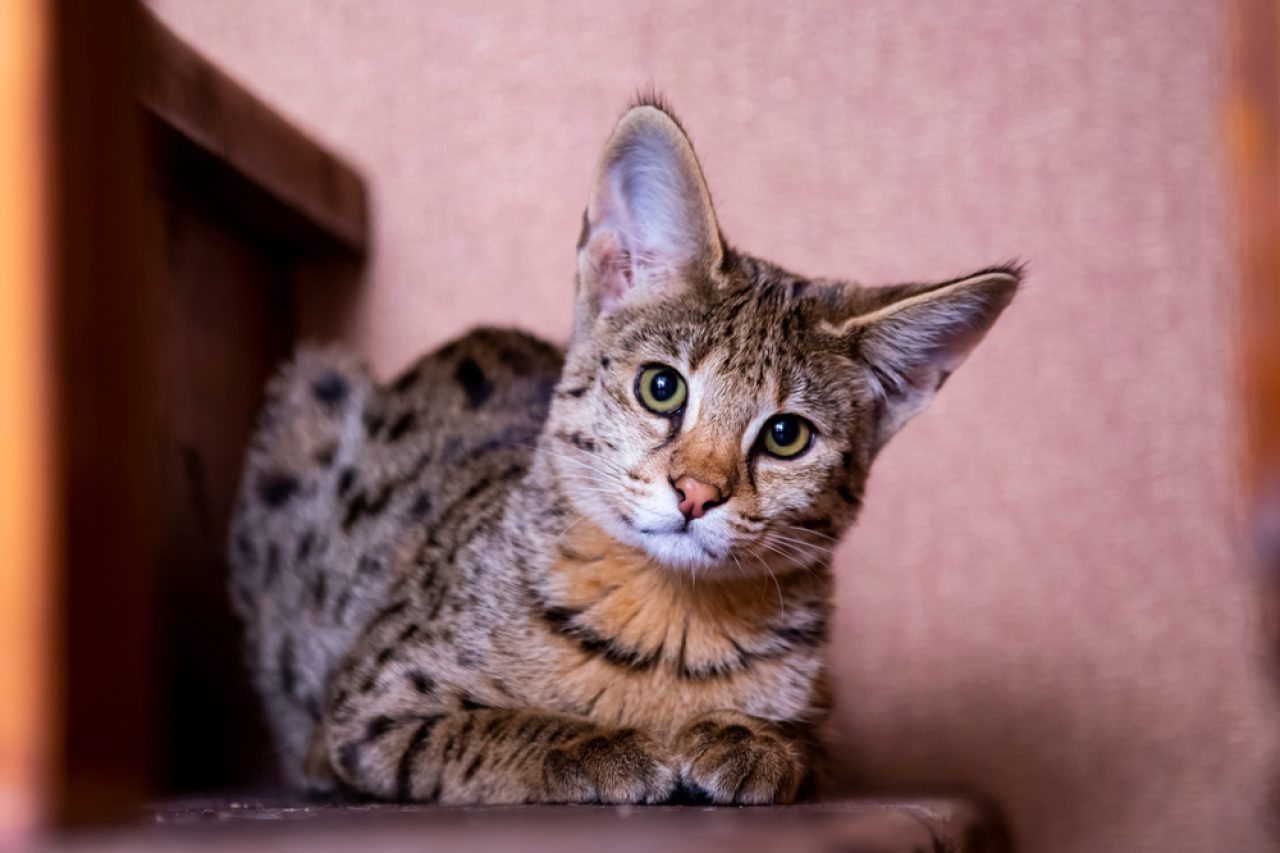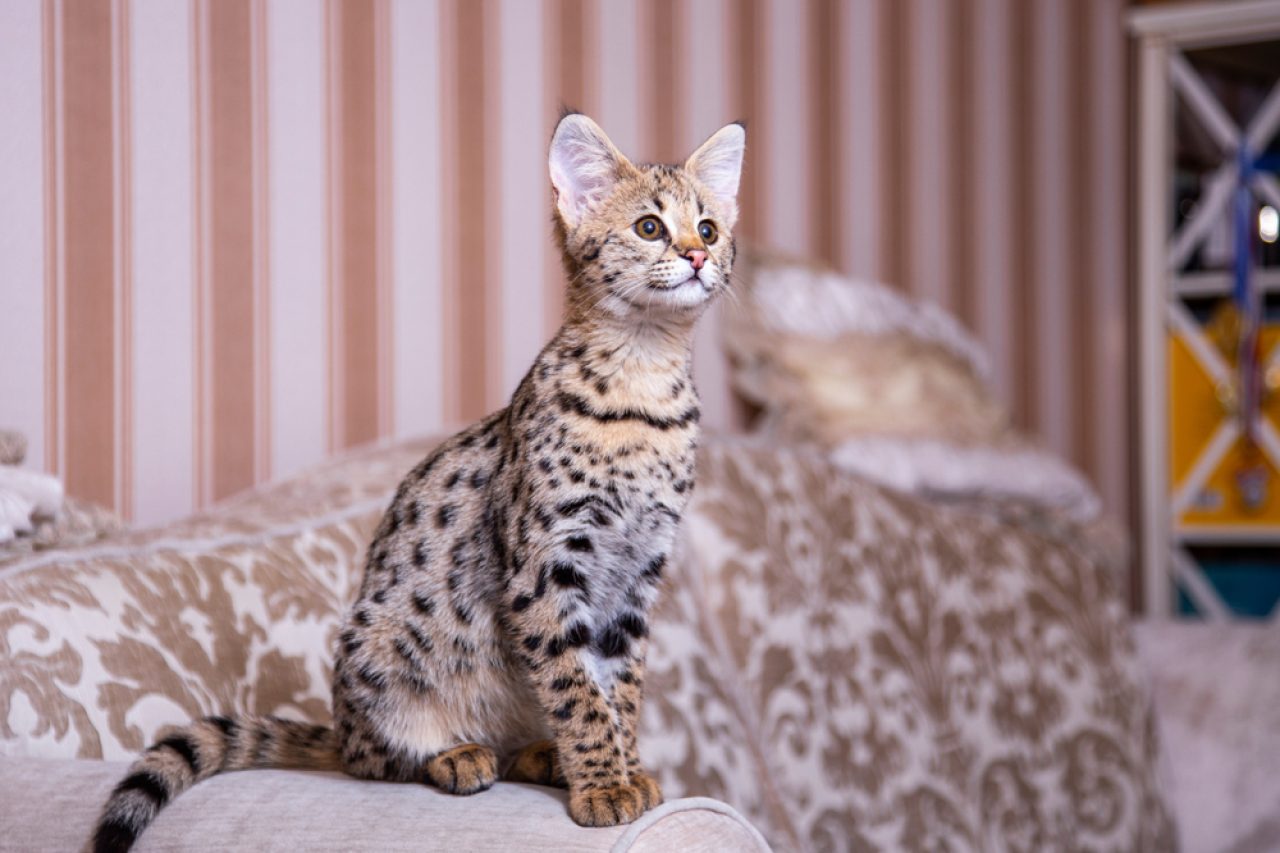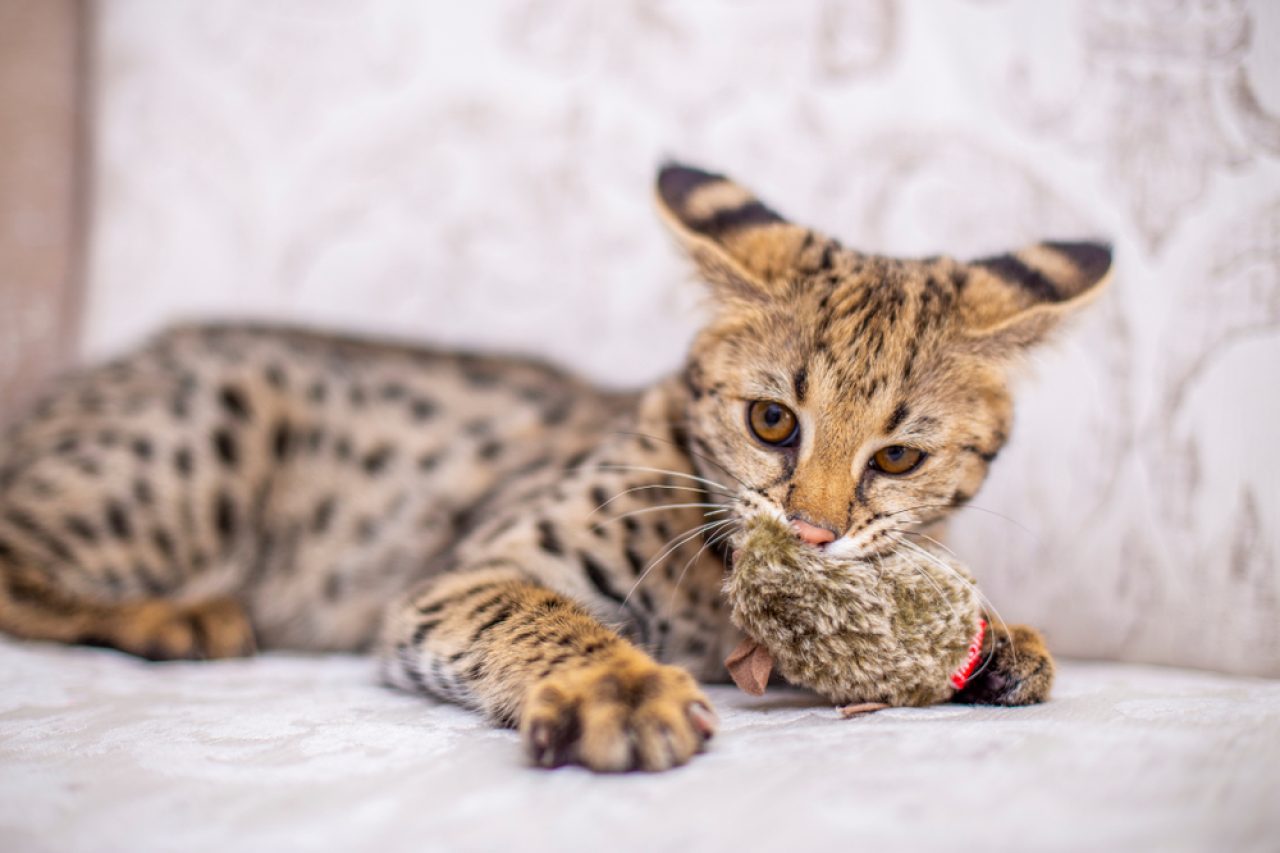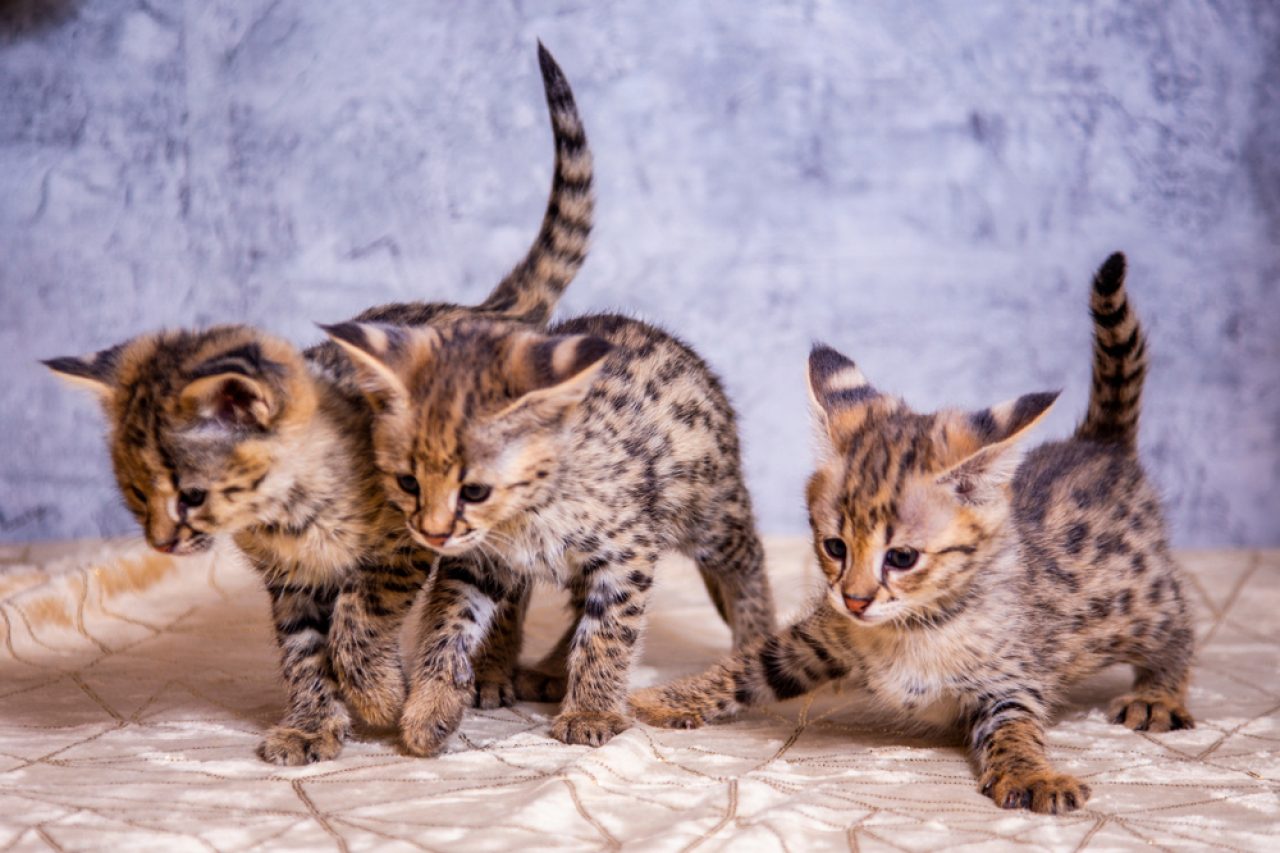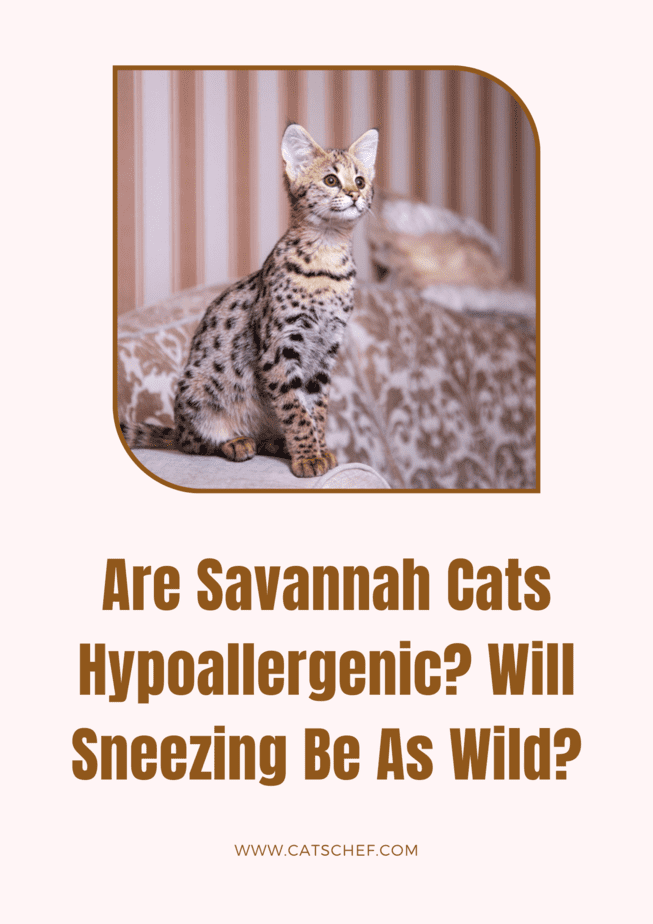📖 Table of Content:
Welcome to the wild side of this blog! No, no, don’t expect me to share some dark secrets in this post. We’re talking about beautiful creatures that are a mix of serval (a wild cat from Africa) and our domestic feline. Today we’re addressing the increasingly asked question: Are Savannah cats hypoallergenic?
Whenever I receive an interesting question (either at the pet shop, or here), I want to share the answer with all of you. Well, the other day, one kiddo sent me an email saying how he wants to surprise his sister with a little ball of fur.
Since she really likes unusual patterns in animals’ fur and unique presents, he decided to get her a Savannah cat. But there is one problem. Their mom is allergic to cats, or at least she was when she was younger. She had some breathing problems, but nothing too serious.
He says she’s been staying away from feline furbabies ever since. However, two weeks ago, they went to a pet shop to get a hamster, and she petted one gorgeous Siberian kitty. Even though nothing happened that day and their mum was perfectly fine, he’s a bit worried.
I couldn’t believe how adorable the message was! He’s only 10 years old and he’s already thinking about all the details his sister likes and about the problems his mom has. Lady, you’ve raised him right!
Anyway, my little buddy Elijah wants to know whether or not Savannah cats are hypoallergenic, so he can get one for his little sister. Are you ready to find out with him? Here’s the lowdown on these magnificent furbabies!
Are Savannah cats hypoallergenic?
To give you a short answer, no, Savannah cats are not hypoallergenic. I know it’s not so easy to read this, especially if you were rooting for the little girl to get this one-of-a-kind gift for her birthday. But that doesn’t mean she can’t have it.
Aren’t you jumping too fast to conclusions? Wait, I’ll explain shortly.
No cat breed is completely hypoallergenic, but when people use this term, they usually mean that a specific type of cat that won’t cause severe allergies. However, all our reactions are individual.
For example, if I’m allergic to cats and I can handle spending time with one breed without symptoms, it doesn’t necessarily mean that you can too. And it’s vice versa as well. If you don’t have any reaction to, let’s say, Maine Coon, I could still have.
For that reason, if you really want to adopt a Savannah cat, don’t ask if they are hypoallergenic. Rather go to the closest pet shop and spend some time with this breed. That will be your truest indicator.
However, in case you’ve had severe reactions before, never test this on your own. Make sure you do it after chatting with your doctor and he or she approved this little experiment. It would be ideal if someone with medical knowledge were present during the test.
Some people can also outgrow allergies, or get used to the allergens and their reactions minimize with time. But, as I told you, be careful about this and don’t do it on your own, please.
Why do people believe Savannah cats won’t trigger your allergies?
The most common misconception in today’s world is that people can only be allergic to cat hair. Since Savannah’s fur is short and they don’t shed as much, people started believing that these beauties are completely safe.
Also, their dander is not produced at high rates since these felines are a mix between a domestic cat and a wild African serval. A lot of people who are allergic have little to no reaction when in the company of these furballs.
This was most evident in those people who had Savannah cats that are F1 or F2 breeds. These signs determine how far they are from their “wild” relatives. The F1 represents those cats whose parents were pure African serval, while the F2 means that their grandparents belonged to this feline “tribe.”
However, they still produce other possible allergens through their skin cells, urine, and saliva. The problem with these three is that they contain a protein called Fel d 1. Their skin cells are mostly attached to their hair, as in other breeds, and that’s why you can’t find a cat that won’t cause allergies.
Their urine and saliva will mostly be present in their litter boxes, so if you’re the one who has to take care of them, and you’ve had allergic reactions before, use gloves while you’re cleaning. That way, you won’t get in touch with the allergens directly.
There are a couple of ways in which you can minimize your allergic response to Savannah cats, but that still won’t make these furbabies hypoallergenic. If you’re curious about how you can do that, here are some top tips.
How can you minimize your allergic response?
None of the cat breeds is completely hypoallergenic, as you already know, but some of them are not going to cause as serious reactions as others. So, what’s the catch? Well, they either don’t shed a lot or don’t produce many allergens in general.
Because of that, there are a couple of ways that can help you to minimize the “cat effect” on someone who’s allergic. No, the person who’s allergic doesn’t have to wear those cleaning rubber gloves to pet your feline.
Here’s how you can do this, but remember, it’s not possible to completely remove all allergens. All cats can cause an allergic reaction, be it mild or severe. You have to be careful, especially if you already have had a serious or life-threatening experience.
So, Elijah my buddy, even though your mum didn’t show any signs of allergies while petting that Siberian kitty, she has to be careful. This is how you can all help her to control the allergens.
1. Grooming
The first thing on the list that I have to mention is definitely grooming. Every cat breed sheds, including Savannah cats. According to what we know, that immediately makes them everything but hypoallergenic.
Since I’ve told you that there are some ways to handle this and minimize the problem, grooming tops the list. You have to help your feline to take care of her fur. Don’t hesitate to buy a high-quality brush and put aside some time to use it.
Not only will your furbaby enjoy the attention and affection (most breeds adore this!), but you’ll also minimize the spreading of her hair all around the place. Collecting it and cleaning will be easier. I mean, you actually know where the hair is.
So, if you want to help someone who’s allergic to cats fight the condition, this is the number one way to reduce the number of allergens in your living space. You can also use wet wipes and give your feline a “shower” from time to time. She’ll surely appreciate it.
2. Training
We can’t answer in affirmative to the question from the start of the article that our little bud Elijah asked: “Are Savannah cats hypoallergenic?” Honestly, it breaks my heart, but let me say that I have one more trick.
You can try to train your pet. It may not be super easy, like with Maine Coons, for example, but it will work out. Spending time with your feline is priceless and when you start training her, you’ll have to be with her.
Start giving her some simple orders and then move to the litter box training, so you could eventually manage to prevent her from getting into the bedroom or the house in general. The best way is if you start working with them when they’re small.
As soon as they adopt the habit, there’s no turning back. Savannah cats are extremely intelligent beings and you definitely won’t need to explain things to them repeatedly. You can also use deterring scents to teach her which areas are safe and which are a definite no-go.
3. Regular house cleaning
I’m not sure that I even have to mention this one, but here it is. You have to clean your house regularly, especially if you have one or more furbabies. Their hair and saliva will be everywhere and, therefore, your home won’t be safe for someone who’s allergic to cats.
A vacuum cleaner has to be your best friend and even though you’re trying to make sure that not a single one of your cat’s hair touches the floor, some will definitely find their way around. So, don’t be lazy – do your chores.
There are also some air purifiers and filters that are specially designed to clean the air from any kind of allergens. In case you think they are a good option for your household, you can explore the possibilities and get one.
4. Health and nutrition
The most important thing is to keep your feline healthy. Whether we’re talking about Savannah cats or some other breed, you have to take her for checkups regularly and make sure she doesn’t have any diseases that can cause excessive shedding.
Your furball will need high-quality meals, like chicken, turkey, or fish, that are full of essential nutritive ingredients. Protein, carbs, and fatty acids will greatly affect your cat’s health and help her maintain a healthy and shiny coat.
Of course, they are obligate carnivores, but don’t forget to add some appropriate dry food into their diet, as well as snacks filled with vitamins and minerals. Avoid giving her too much rice or corn since they are full of low-quality carbs that are not healthy for them in greater amounts.
Final words
These furbabies will be your bundle of joy for about 10 to 20 years, and since Savannah cats aren’t hypoallergenic, you have to make sure you’re ready for this commitment. There won’t be time to say, “I’ll clean their little box tomorrow,” because you’ll have to do it immediately.
Even though most people can’t completely avoid allergies, some ways can help you minimize the effect cats have. So, take these tips to heart and you’ll have the time of your life with a pawsome companion!
Don’t forget to have your vet on speed dial in case you need urgent advice from him because he’s the one who’ll be able to clear any doubts you may have. Oh, and also, have fun while getting to know your fur buddy!
